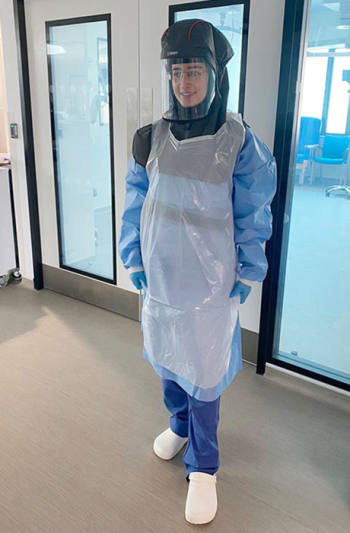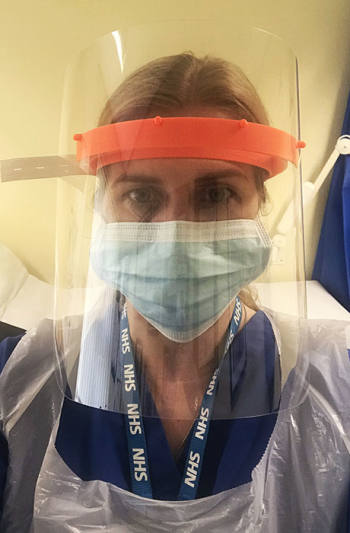We know that hospitals complete better, on regular, when they are led by health professionals. But being a fantastic clinician is not ample. Medical doctors also will need management enhancement, which right until not long ago has been unavailable. With the formation of a skilled entire body, the School of Clinical Management and Administration, and entry to apprenticeship levy money (a Uk federal government tax on companies to fund instruction) points are setting up to change.
At Cass Organization University we operate a management and administration masters diploma designed for clinical health professionals. The diploma grew out of my research into clinical management in hospitals — the coronavirus crisis offers the possibility to obtain out how our frontline pupils are working with their competencies.
Sanjiv Sharma, clinical director of Excellent Ormond Avenue Clinic for Children, claims the pandemic has examined the Uk health care system as by no means prior to. He believes it is proper that clinical leaders have been at the centre of the response.
“We have all found excellent and terrible examples of management about the previous number of weeks. Clinically led decision-creating will will need to continue on when we swap products and services back again to a new ‘steady state’ in probably useful resource-confined, Covid-19 afflicted environments,” claims Dr Sharma.
We released the medics to approaches this sort of as individual and group coaching. These were being specially handy to Adrian Cree, a advisor forensic psychiatrist. At the begin of the pandemic he was promoted from clinical director to group clinical director at the Priory Group, the UK’s greatest psychological health care service provider.
“The coaching and motion learning delivered a risk-free room for me to be challenged, to mirror and perform as a result of vital challenges,” he claims. “Improved communication competencies, dilemma solving, resilience, applying change, and management design and style also aided me to hit the ground working.”

Our research exhibits that being a knowledgeable leader positively affects employee morale and therefore efficiency. Hanieh Asadi, an intense care medical professional, highlights the management competencies that are wanted: “open and trustworthy communication, to practise lively listening, give clarity close to roles, lead by illustration, empower individuals, and realise the importance of non-verbal communication”.
In the course of the months prior to the onset of the pandemic, Hsien Chew, head of clinical products and services, joint ventures at HCA Health care Uk, a private health care group, had currently put into position a number of interventions learnt from the training course. He believes this belief and excellent will “[was] a important ballast from the impending panic, specially throughout the choppy very first wave of the pandemic”.
Dr Chew claims his own psychological health and fitness has been aided as he formulated being familiar with about his own strengths and weaknesses. He was also “able to share experiences with other associates of my cohort with whom I have a exceptional skilled honesty”.
In hospitals, the pressure has been compounded by the acute psychological distress of caring for large volumes of critically unwell clients coupled with large mortality charges, no household to help clients, and the problem of communicating as a result of the barrier of scorching and restrictive own protective tools.
To cope with these components, Nick Prince, advisor paediatric intensivist at London’s St George’s Clinic has immersed his staff in the principle of psychological intelligence: they consciously practise approaches to motivate empathy and self-recognition.
When the coronavirus has been all consuming, Russell Durkin, advisor in crisis medication at the Royal Totally free Clinic in north London, believes it has also revitalised the NHS.
“Covid-19 has been the biggest illustration of change administration that the NHS has found considering the fact that its formation. Boundaries to change have been swiftly removed organisations or departments have remodelled practically overnight new ways for working have been trialled and examined interdisciplinary speciality collaboration has emerged easily.”

There has also been fast change in the broader health and fitness services. Kirsty Gillgrass, GP and clinical director in charge of Covid-19 at the Sheffield Medical Commissioning Group, believes her know-how of transformational change principle has aided build groups and constructions. She has overseen new ways of working for the city, making sure crisis care proceeds and deciding which products and services can be securely paused.
Searching over and above the acute phase of the pandemic, the clinical profession faces the fret of a big client backlog. The greatest number of outpatients in the NHS are in ophthalmology departments that deal with conditions of the eye, with 9m appointments a 12 months. Bansri Lakhani, ophthalmology resident at Nottingham University Hospitals, has currently designed, costed and acquired board approval to implement a virtual clinic for glaucoma clients to substantially increase outpatient potential.
It is just a person of quite a few transformational health care ideas that will appear from experienced clinical leaders as the world emerges from the crisis.
Cass Clinical Leaders Community is a LinkedIn group to help all health professionals and clinical leaders throughout coronavirus, presenting free resilience coaching and other assets.
The creator is affiliate professor at Cass Organization University and training course director for Govt Masters in Clinical Management.
Medics’ suggestions for effective crisis management
1. Make certain specialists are at the frontline with improved powers and obligations
2. Loosen bureaucratic constraints to permit processes to move extra quickly
3. Permit spontaneity in the system and request entrepreneurial and creative alternatives — some of them may well adhere
four. Cut down hierarchy in conferences and motivate anyone to lead ideas
5. Consider approaches from multiple views — what may well the unintended penalties be?
6. See connections — what will work locally could perform at scale
seven. Handle uncertainty as a great deal as doable — your own and others’
eight. Connect on a regular basis, be reliable, and if you don’t know, say so
9. Glimpse just after your own psychological health and fitness and wellbeing
ten. This is a big learning chance. Hold a everyday journal to mirror on how you have responded as a leader
Supply: Amanda Goodall/Cass



